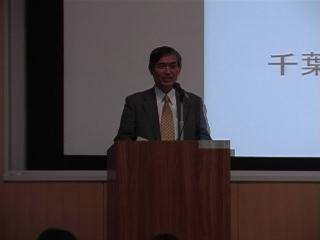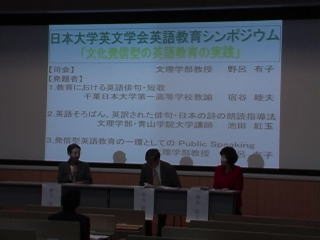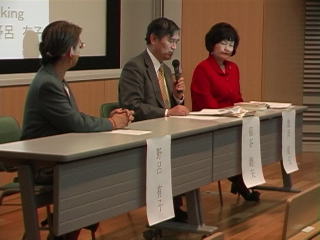| 英語教育シンポジアム 「文化発信型の英語教育の実践」 |
| Symposium on English Education “Actual Teaching English as a media to express oneself” |
主催:日本大学英文学会(会長 日本大学文理学部教授 原公章)
日時:2005年10月22日(土)午後2時より
場所:日本大学文理学部図書館三階オーバル・ホール
「教育における英語俳句・短歌」
千葉日本大学第一高等学校教諭 宿谷睦夫
Sponsorship:The learned Society of English literature
(President= Professor of Bunri-department of Nichidai, Kimitaka Hara)
The time & date:2:00pm 22th(Wed) Oct. 2005
The place:3rd floor of the New Library in Bunri-department of Nichidai
“Teaching Haiku & Tanka in English” by Mutsuo Shukuya
(English instructor of Chiba-nichidai-ichiko high-school)


| “Teaching Haiku & Tanka in English” by Mutsuo Shukuya (English instructor of Chiba-nichidai-ichiko high-school) Introduction I would like to introduce the actual teaching haiku & tanka in English in my class as Dr. Kimitaka Hara recommend that I lecture in this Symposium. As soon as I sent Dr. Hara the article printed in the Asahi-Weekly (23rd Jan. 2005), in which English haiku composed by some students of my school & my essay on haiku were introduced, he sent me a card with the following message: "I believe that teaching haiku in English in class is one of the best ways to nourish such basics as ‘power of observation’ & ‘a linguistic sense’ as I have worried about teaching English in Japan where most English instructors only teach skills of understanding and let the students learn insincere & shallow English lessons. 1. Composing haiku & tanka is to nourish the basics to produce various works of literature Olden authors such as Saikaku Ihara, Ichiyo Higuchi (whose face is printed on 5000 yen bills) and Ryunosuke Akutagawa (author of ‘Rashomon’ whose scenario become a famous film worldwide) wrote haiku (called renga) & tanka before they published their famous works: it became a fundamental exercises for writing long sentences such as essays, diaries and novels and so on. In olden times, most poets composed choka (57/57/57/77….) as well as haiku (called katauta 57/7) and tanka (57/57/7) but gradually they lost their ability to compose choka because new fields such as essays, diaries and novels and so on appeared. 2. The necessity to learn English as a media to express oneself but not understanding After World War II, we Japanese found that they should cultivate themselves much more with the Europeans & Americans who had conquered them. So they have been learning English as a media to understand the excellent industry, economy and cultures of other developed countries, such as America, France, England and so on. But after 1964, when the “Tokyo Olimpic Games” were held in Japan, they found that they should learn English not only to understand the excellent aspects of other countries but also to teach about themselves and their good culture and others. This message was promoted by emeritus professor of Keio University, Takao Suzuki. 3. My career in teaching English tanka Study of English in the USA for one year about 30 years ago Composing English tanka & translating tanka into English(publishing a book, tanka collection)Promoting not only English tanka but also English choka (long poems) & Acrostic poems. 4、Recommendations for English Education in Nichidai 〇、 Entrance Examinations (in which students should be demanded to write about themselves) 〇、Teaching materials(English to learn Japan & Japanese culture) 5、Other essays printed on Newspapers and Magazines Series ①「English tanka course」on bilingual monthly magazine “Plaza” others ① 「English haiku/tanka」The English Teachers’ magazine (Taishukan) Oct. 1999 (Japanese) from Special Articles “ Various Activities & Teaching materials to promote vivid lessons” ② 「teaching haiku in English to nourish such basics as ‘English ability’ & ‘a linguistic sense’」 Asahi-Weekly 23rd Jan., 2005 (Japanese) ③ Students Encouraged to Enter Haiku Contest Asahi-Weekly 2nd Oct., 2005 (...www.asahi.com/english/weekly/special/s01.html -) If you can't think of anything to write for the fourth E-haiku contest (English haiku contest for students), a good place to start would be from your summer vacation memories. Last year's winner wrote about walking along the pond with her boyfriend in the moonlight. And two years ago, the winner wrote about the screaming of cicadas in the trees and the fireworks sparkling in the summer night sky. Most people would enjoy reading about the birds chirping in the plum trees― whose blossoms are in bloom ― along with watching the cherry blossoms at their best in spring while hearing the singing of various birds. From summer, we can each fondly recall the look of white flowers in the moonlight or the sound of screaming cicadas in the trees and the bursting of fireworks. Other seasons offer different sights, sounds and smells for haiku. In autumn, the morning glories and the bush clovers with dew also paint a vivid picture. In winter, migrating birds, like wild geese in flight, and landscapes covered with snow can be captured in haiku. Furthermore, students can draw on their good experiences during their school excursions, their field days and their school festivals. Not to mention unexpected events that occur in their daily lives. I hope you can write about any of these that I mentioned above. I also wrote the following haiku when I visited Tenmangu Shrine in Kyushu with my students: An olden tree, which / has lived a thousand years, stands / in Tenmangu Shrine. And in response to a student who watched the leaves swaying in the cool afternoon breeze, I composed the following: The sparrows are just / flying about the trees, which / stand in my school yard. Some haiku, which are based on mere ordinary events in our lives, often still can touch our hearts ― so I hope you will try to compose haiku in English from your experiences this summer.  |
「教育における英語俳句・短歌」 千葉日本大学第一高等学校教諭 宿谷睦夫 はじめに 受験英語のみならず、TOIEC流行の昨今、言葉の心よりも、「技能」ばかり、口先の英語学習に危機意識を持ち続けているなか、英語俳句が『物を見る目』と『言語感覚』の2つを育てる良い方法である、という有識者のご意見を聞くにつけ、教育におけるその取り組みをご紹介したい。 一、 俳句・短歌は諸文芸の元 井原西鶴、樋口一葉、芥川竜之介等有名な作家はその文芸作品を発表する前に歌を修練している。制限された文字数で書く訓練として現在でも行なわれている。万葉時代は片歌(五七・七)から始まって短歌(五七・五七・七)・長歌(五七・五七・五七・七)へと進んだが、その後、随筆(エッセイ)・日記・小説等の形式が現れ、古今集の時代には長歌を自分の作品として発表する歌人がいなくなった。 二、英語の発信文化への変遷 此れまでの英語は日本の国是として優れた先進国の産業・経済・文化等を逸早く吸収して、それに追い着くためのものであった故、その教育方法は受信型であった。しかし、戦後の著しい発展のお陰で現在の日本は先進国入りしたと言える。すると此れまでは海外からいろいろなことを学ぶだけで良かったものが、これからは海外に教えることも必要になってきた。それに伴って、英語は受信の手段のみならず発信の手段(文化)でなければならなくなってきた。この問題に対して、関係者から大きな期待を寄せられている慶応大学名誉教授の鈴木孝夫先生がお話になられました。先生のご主張の中に、英語が発信文化へと変遷してきた経緯をお話し戴いた。 その一つは、1868年に中国を模範にしていた姿勢を西欧に変えたことである。 二つ目は、1945年の戦後である。今度は西欧を模範にしていた姿勢をアメリカに変えたことである。 鈴木先生のご主張の最後は、1964年の東京オリンピックの時だったというのである。アメリカを模範にしていた姿勢を日本は自国自身に変えたというのである。 三、私の英語教育に対する歩み 勤続5年目にして、アメリカへの語学研修 英語短歌の翻訳並びにその創作(著書の出版) 英語短歌から長歌・折句へ 四、現在の英語教育への推進対策 〇、 標準・統一テストの改定 〇、テキストの作成(日本のことを英語で学ぶ) 五、メデイアでの発表 連載①「英語短歌講座」(「古典短歌講座」の原本) 他 ① 「英語haiku/tankaのすすめ」英語教育(大修館)1999年10月増刊号(邦文) 特集「生き生きとした授業を作るこんな活動・こんな教材」にて ② 「感性と英語力をのばす英語授業に俳句を」(朝日ウイークリー)23rd Jan.2005(邦文) ③ 「英文小論「E-俳句に挑戦する皆様へ」」(朝日ウイークリー)2nd Oct.2005 (...www.asahi.com/english/weekly/special/s01.html -) 今年の四回目の俳句コンテストに何を投稿したらよいか考えている諸君がいたら、その手がかりとしてこの夏休みの思い出を辿ってみたらいかがだろうか。 昨年の優勝作品を見ると「友人」「月」「池」が歌の対象になっています。一昨年の優勝作品は「夏の日の蝉」と「夜の花火」です。現代でも誰もが、春になれば「梅に鳴く鶯」に「百(もも)鳥(どり)の鳴く頃に咲く櫻」、夏は「満月に咲く夕顔、そして蝉や花火」の俳句を楽しむことでしょう。その他の季節でも景色や音や匂い等、俳句の題材に事欠くことはありません。秋は「露を置く萩(はぎ)や朝顔」は活き活きとした映像を醸(かも)し出します。冬は「雁(かり)を初め渡鳥や雪景色」は俳句としてその映像を捉えることが出来ます。 その他にも、高校生であれば修学旅行や体育祭や文化祭でも新しい体験があったことでしょう。また、毎日の授業や部活、登校や下校の際にも思いがけないことに出くわすことがあったことと思います。そんな出来事を俳句に綴(つづ)ってみて戴きたいものです。 私も修学旅行で生徒と一緒に九州の大宰府を訪れた時、次のような俳句を詠みました。「千歳(ちとせ)経(ふ)る楠(くすのき)茂(しげ)る梅の里」また、授業中に窓辺から爽(さわ)やかな風が吹き寄せて来た時、生徒からリクエストがありました。そこで、即座に「学舎(まなびや)の裏庭の木々雀舞ふ」と詠みました。 日常的な内容であっても人々の心を打って来たのが俳句です。この俳句コンテストを機会にこの夏に経験したことを題材に英語俳句に挑戦してみてください。(日本語原文) 以上 此れまでの英語は日本の国是として優れた先進国の産業・経済・文化等を逸早く吸収して、それに追い着くためのものであった故、その教育方法は受信型であった。しかし、戦後の著しい発展のお陰で現在の日本は先進国入りしたと言える。すると此れまでは海外からいろいろなことを学ぶだけで良かったものが、これからは海外に教えることも必要になってきた。それに伴って、英語は受信の手段のみならず発信の手段(文化)でなければならなくなってきた。するとその教育も発信型のものにしていかなければならなくなってきた。英語教育に携わる誰しもがこの変化に如何に答えるかと憂慮しているのが現状である。これが実現出来ていないのが実情だからだ。ある研修会でもこれを如何に解決すべきかが大きな課題であった。そこで、基調公演にはこの問題に対して、関係者から大きな期待を寄せられている慶応大学名誉教授の鈴木孝夫先生がお話になられました。先生のご主張の中に、英語が発信文化へと変遷してきた経緯をお話し戴いた。 近代日本は自国の姿勢を3度変えてきたというのだ。その一つは1868年に中国を模範にしていた姿勢を西欧に変えたことである。二つ目は1945年の戦後である。今度は西欧を模範にしていた姿勢をアメリカに変えたことである。原爆を二つも落とされ、東京大空襲では数十万の市民が爆撃機B二十九が落していった焼夷弾によって焼き殺ろされていきました。虫けらを殺すようなやり方でした。アメリカは最近ではイラクやアフガニスタンで同じようなことをやりました。イラクやアフガニスタンではこのアメリカの仕打ちに対して計り知れない恨みを抱きました。そしてこの恨みは今後大きく尾を引いていくでしょう。しかし、日本人は太平洋戦争で受けた恥辱を恨みで返したでしょうか。勿論、この恨みの消えない人々もいるでしょう。しかし、多くの日本国民は、神国日本と思っていた日本をここまで痛めつけるアメリカに尊敬と敬意をもってしまったのである。そして、現在の復興をものにしたのだ。鈴木先生のご主張の最後は、1964年の東京オリンピックの時だったというのである。アメリカを模範にしていた姿勢を日本は自国自身に変えたというのである。しかし、日本の政府官僚はこぞってその変化に対応出来ていないというのが中心的なご主張であった。 |
| 古典短歌講座(第1版) Classical Tanka composition in English (1) |
| プラボットの異端児(短歌入門部屋)に戻る 当サイトはリンクフリーです、どうぞご自由に。 Copyright(c) 2010 Yoshihiro Kuromichi(plabotnoitanji@yahoo.co.jp) |
||